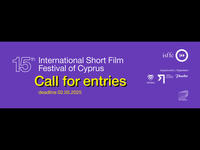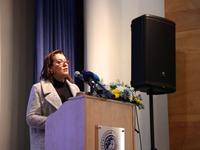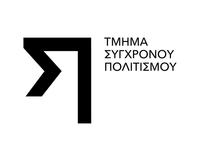Press Releases

02-02-2025 19:17
Speech by the Deputy Minister of Culture, Dr Vasiliki Kassianidou, at the Ukraine Culture Conference: “Cooperation for Resilience” in Uzhorod, Ukraine
“National and international Sanctions: Countering Illicit Cultural Property Trafficking”
Dear Minister Mykola Tochytskyi
Esteemed colleagues,
Dear friends,
It is an honour to have been invited to the first Ukraine Culture Conference and to be given the opportunity to contribute to the discussion on countering illicit cultural property trafficking. In my intervention, I will bring to the table my country’s experience from this serious, and often neglected, consequence of war which Ukraine is currently facing. The world remains astonished almost three years after the beginning of war in your country. Please allow me to extend the heartfelt sympathy of all Cypriots and our wishes and support for achieving a long-sought peace.
This past July marked five decades since the 1974 invasion and illegal occupation of Cyprus by Turkey, which caused loss of human lives and livelihoods. Until today over 36% of the territory of the Republic of Cyprus remains occupied by the Turkish Army. Greek Cypriots are not allowed to live in their homes or use freely the more than 550 religious monuments which are located in the occupied part of the island. Furthermore, more than 200 listed Ancient Monuments are beyond the effective control of the competent authorities and therefore our rich and millennia-old cultural heritage suffers from ongoing destruction, looting and illegal export. The damage caused is grave and, in many cases, irreversible. The Deputy Ministry through the Department of Antiquities strives to monitor illicit excavations in the occupied territory, and the trafficking of antiquities. We estimate that tens of thousands of ancient artifacts and religious relics have been lost. Regularly our officers identify and trace to dealers, antiquities trade markets and auctions around the world, looted Cypriot cultural objects.
There is an urgency to act because despite legislative measures, international conventions and the wide dissemination of codes of ethics, the trade in antiquities is rampant, as the advancement of detecting and looting techniques and the expansion of online auctions have multiplied prospective clients and the number and type of objects up for sale.
We strive towards combatting illicit trafficking of our antiquities through international or transnational cooperation and by evoking international Conventions and UN emergency actions which deal with issues of illicit export and trade of cultural heritage. Particularly important for Cyprus and now for Ukraine is the 1954 Hague Convention and its two Protocols for the Protection of Cultural Property in the Event of Armed Conflict. Worthy of note are the 1970 UNESCO Convention, the 1995 UNIDROIT Convention, as well as the 2017 Council of Europe Convention on Offences relating to Cultural Property, known as the Nicosia Convention, which we urge you to ratify. This is currently the only international treaty focusing on criminal measures and sanctions on illicit activities, such as the destruction and trafficking of cultural heritage, while also providing a complete set of measures to foster international cooperation between States to better prevent and combat the illicit trafficking and deliberate destruction of cultural property.
It is also important to mention the contribution of organisations, such as the International Council of Museums (ICOM) with its codes of ethics and guidelines for museums regarding acquisition policies and due diligence procedures, its 100 Missing Objects series and the Red Lists Database. The contribution of Interpol is extremely valuable with its Works of Art Database, posters, published every June and December of most wanted stolen works of art and of course, its investigations.
Finally, the EU’s Integrated Approach to External Conflicts and Crises also addresses cultural heritage in conflicts and crises. As recognised in the Council Conclusions on EU Approach to Cultural Heritage in conflicts and crises, which was adopted in 2021, cultural heritage is an important vehicle for peace, democracy and sustainable development by fostering tolerance, mutual understanding, reconciliation, inter-cultural and inter-faith dialogue, mitigating social tensions and preventing renewed escalation into violent conflict.
Dear friends,
Cyprus is the EU member state which can better understand what Ukraine is currently facing. This is why I am here today and this is why I am morally committed in support the proposed declaration.
As you can see Cyprus sadly holds important expertise on legislative and investigative means of countering Illicit Cultural Property Trafficking. I would therefore like to take this opportunity to invite a small expert group from Ukraine to come for a study visit in Cyprus, where they can benefit from this expertise and see how our officers maintain inventories and digital archives of cultural objects and monuments, something which we see as one of the pillars of our fight against the loss of our cultural heritage. They can also see how we collaborate with other governmental sectors such as the police, the legal department and the customs office, but also international organisations such as Interpol.
Dear Minister,
Cyprus is here together with many other EU members to support you and your efforts to protect your cultural heritage and cultural sector. We stand with Ukraine for as long as it takes.
Thank you all very much for your attention.
(EK/MS)
Relevant Press Releases







